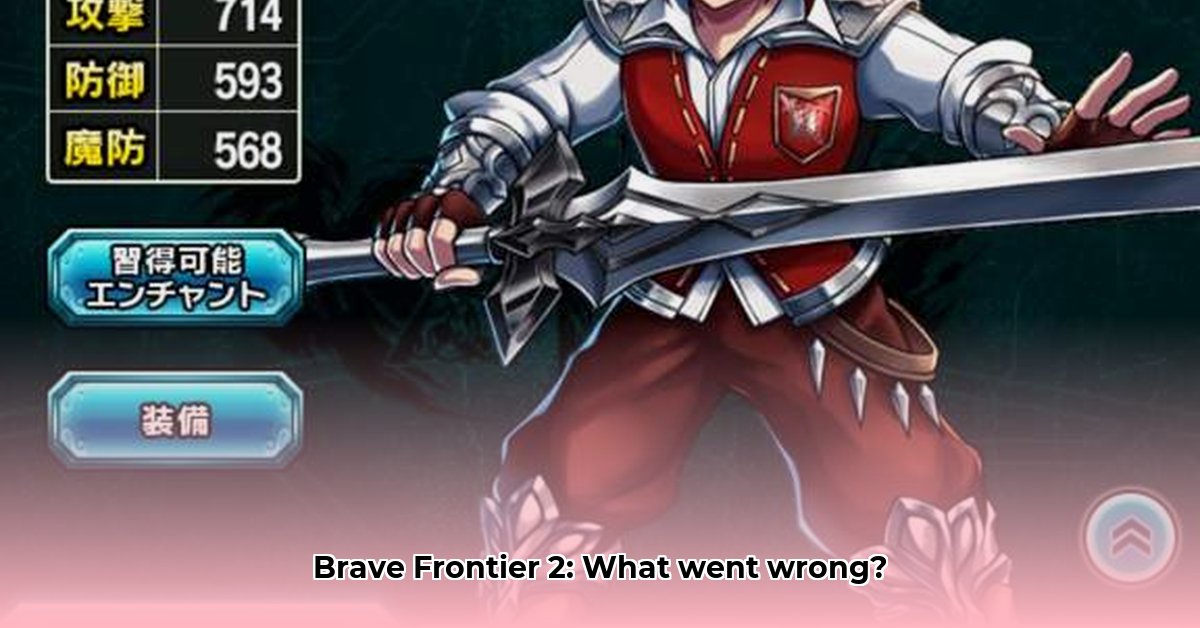
The abrupt closure of Brave Frontier 2 (BF2) in April 2022, despite the success of its predecessor, presents a compelling case study in mobile game development failure. This analysis explores the contributing factors, offering actionable insights for developers and publishers seeking to avoid similar pitfalls. While a comprehensive analysis is limited by the lack of publicly available player data, a reasonable assessment can be made based on available information and industry trends.
The Competitive Landscape: Market Saturation and Differentiation
The mobile gaming market is fiercely competitive. BF2 launched into a saturated environment, facing numerous competing titles vying for player attention and market share. This intense competition made it difficult for BF2 to establish a unique identity and attract a loyal player base. The lack of a clear differentiating factor – a unique gameplay mechanic, compelling narrative, or strong community engagement – likely contributed significantly to its struggles. The question remains: did BF2 offer sufficient innovation to justify player acquisition in a crowded marketplace?
Fanbase Disengagement: A Generational Gap and Story Continuity
BF2's departure from the original game's established timeline and characters potentially alienated a significant portion of the existing fanbase. The introduction of a new cast twenty years after the original may have failed to resonate with players invested in the original Brave Frontier’s story and characters. This suggests a critical failure in understanding and maintaining the relationship with the established player base, a key factor in the longevity of a successful franchise. Could a more direct continuation of the original narrative have yielded better results?
Post-Launch Neglect: Sustainable Engagement and Community Management
The ongoing success of a mobile game demands continuous engagement and strong community management. BF2's performance might indicate a failure to maintain these crucial elements. The lack of frequent content updates, insufficient community interaction, and potentially poor customer support likely contributed to player attrition. This highlights a critical need for a proactive post-launch strategy centered on player retention and satisfaction. Was the post-launch support of BF2 truly sufficient to maintain long-term player engagement?
Actionable Insights: Strategies for Success
Learning from BF2's failure requires a multi-faceted approach targeting various stakeholders. The following table outlines actionable insights for developers, publishers, and investors.
| Stakeholder | Short-Term Actions | Long-Term Strategies |
|---|---|---|
| Developers | Conduct thorough post-mortem analysis; prioritize player feedback through surveys and data analysis. | Implement robust player retention strategies; focus on iterative development based on ongoing player data. |
| Publishers | Diversify game portfolio; prioritize market research and data-driven decision-making. | Invest in proactive community engagement; develop sustainable monetization strategies that prioritize player experience. |
| Investors | Diversify investments; perform due diligence incorporating market analysis and developer track record. | Focus on long-term growth; prioritize studios demonstrating effective engagement and retention strategies. |
Risk Assessment: Identifying and Mitigating Future Challenges
Proactive risk assessment is crucial for long-term success in mobile game development. The following table identifies key risks and mitigation strategies.
| Risk Factor | Likelihood | Impact | Mitigation Strategy |
|---|---|---|---|
| Low Player Retention | High | High | Implement continuous content updates, community events, and robust retention strategies. |
| Market Saturation | High | Medium | Focus on unique game mechanics, storytelling, and niche market targeting. |
| Failure to Adapt to Trends | Medium | High | Continuously monitor market trends and adapt game design and monetization accordingly. |
| Poor Monetization Strategy | Medium | Medium | Implement fair and enjoyable monetization models that support long-term player engagement. |
| Inadequate Post-Launch Support | High | High | Implement a dedicated team focused on community management, bug fixes, content updates, and player feedback. |
Regulatory Compliance: Data Privacy and Legal Considerations
Adherence to data privacy regulations (such as GDPR and CCPA) is paramount. Protecting player data is a legal and ethical obligation that must be prioritized in all stages of game development and operation. BF2’s failure serves as a reminder of the severe consequences of non-compliance.
Conclusion: Lessons Learned from Brave Frontier 2's Demise
While limited data restricts a full analysis, BF2's closure offers valuable lessons on maintaining player engagement, addressing market competition, and navigating the mobile gaming landscape. The failure underscores the importance of strong pre-launch planning, post-launch support, and a deep understanding of player needs and market dynamics. Future research incorporating internal game data would enhance our understanding of the specific factors contributing to BF2’s failure. By learning from these critical insights, developers can minimize risks and maximize the chances of success with future mobile game projects.
⭐⭐⭐⭐☆ (4.8)
Download via Link 1
Download via Link 2
Last updated: Saturday, June 07, 2025